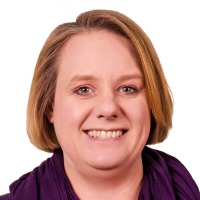
Stacie Traill (@straikat) is a Metadata Analyst at the University of Minnesota Libraries, and has worked extensively with electronic resources metadata and library discovery and management systems over the past decade. She attended the 2017 DLF Forum as an ER&L Cross-Pollinator.
As a mid-career librarian who has spent my career working in and around traditional library technical services (acquisitions, cataloging, electronic resources management, and systems), I was honored and delighted to have the opportunity to attend the DLF Forum as an ER&L cross-pollinator fellow. Although I regularly speak and collaborate with my own institutional colleagues in digital collections, I don’t always have many opportunities to hear about and explore digital library work elsewhere. By attending the DLF Forum, I hoped to engage with colleagues doing digital collections work that was similar to my own — but in what is “the other side of the house” in many libraries, where digital collections and archives are administratively distinct from traditional technical services.
My Forum experience did not disappoint. I found a wealth of interesting and helpful talks and working sessions on metadata assessment and management, topics that are eternally near and dear to my heart as a metadata analyst. Though standards and systems might differ between traditional library metadata (read: MARC) and digital collections, the tools and techniques presented and discussed are relevant and useful across metadata domains, and I brought home a number of promising ideas — ranging from the practical and immediately useful to broad, aspirational goals — that I hope to implement in my own work. I really appreciate the possibility of continuing these conversations beyond the conference, notably via the Metadata Support Group Slack channel, which gives me an easy way to track and participate in ongoing discussions on this topic, and to follow the work of the DLF Metadata Assessment Interest Group.
Sessions on project management, discovery, and linked data were equally pertinent and useful. Unsurprisingly, these have been hot topics among electronic resources librarians, catalogers, and library systems managers at many other conferences I’ve attended over the past few years, and I’ve learned a lot from my colleagues in those venues. But the DLF context refreshed and enriched those topics in unexpected ways. With the concerns of unique resources and collections a constant presence throughout various talks and sessions, one major tension that is always present in the work of libraries became much more explicit: how to adhere to standards and collaborate across institutions while building/providing services for users and communities with vastly different experiences, histories, and needs. For me, DLF’s foregrounding of this basic tension brought a renewed sense of urgency and enthusiasm to the work of improving discovery – something that is not always easy to sustain in the day-to-day grind of completing project tasks and problem solving.
Among so much useful and thought-provoking content, some of the conference’s larger themes continue to resonate with me: the emphases on social justice, diversity, and fair labor practices. The DLF community’s engagement with these issues and willingness to ask hard questions of itself (and libraries/archives more generally) is so important. A few days at DLF, where I had the all-too-rare chance to just sit back and listen, convinced me that I don’t see enough of this engagement in many of my other professional communities. These issues, more than anything else, are something I will try to engage with both more fully and more directly in other professional spaces in the future.
